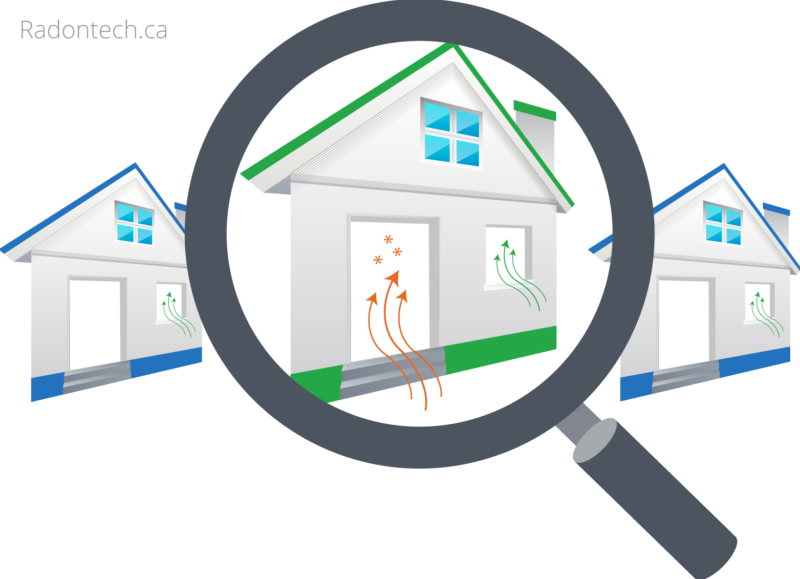What Edmontonians Need to Know about Radon Gas

Every homeowner in Edmonton should know about radon gas.
What is Radon?
Radon is a radioactive gas that comes from the ground. It is formed as a product of the breakdown of uranium in the soil. Radon is harmless outdoors because it dissipates and dilutes in outdoor air. In buildings, radon can seep in and accumulate undetected through areas where houses come in contact with the soil.
Why Should You Care About Radon?
1. Exposure to high levels of indoor radon can cause lung cancer.
2. Radon gas is the second leading cause of lung cancer in Canada.
3. Health Canada estimates that, in Canada, radon is linked to about 3,200 lung cancer deaths per year!
The risk of developing cancer is even greater for smokers.
- Smoking alone: 1 in 10 chance of developing lung cancer.
- Smoking and exposure to radon: 1 in 3 chance of developing lung cancer
Useful Facts About Radon in Canada
![]() Radon has been labelled a “silent killer” because it is linked to 16% of lung cancer deaths in Canada, about 3,200 every year, despite the general lack of awareness around it.
Radon has been labelled a “silent killer” because it is linked to 16% of lung cancer deaths in Canada, about 3,200 every year, despite the general lack of awareness around it.
![]() Radon concentration in the air is measured in units of Becquerels per cubic metre (Bq/m3).
Radon concentration in the air is measured in units of Becquerels per cubic metre (Bq/m3).
![]() Health Canada has developed guidelines for radon levels in buildings: it is recommended that radon levels in buildings in Canada be below 200 Bq/m3. Remedial measures should be take if indoor radon concentrations are 200 Bq/m3 or above.
Health Canada has developed guidelines for radon levels in buildings: it is recommended that radon levels in buildings in Canada be below 200 Bq/m3. Remedial measures should be take if indoor radon concentrations are 200 Bq/m3 or above.
![]() Health Canada recognizes the Canadian National Radon Proficiency Program (C-NRPP) as the official organization that trains and certifies Canada’s radon professionals.
Health Canada recognizes the Canadian National Radon Proficiency Program (C-NRPP) as the official organization that trains and certifies Canada’s radon professionals.
![]() Canadians are starting to take action on radon. Quebec has tested all schools, Ontario has a bill in parliament that will mandate testing in public buildings, day cares and businesses.
Canadians are starting to take action on radon. Quebec has tested all schools, Ontario has a bill in parliament that will mandate testing in public buildings, day cares and businesses.
A recent Health Canada study estimates that about 7% of Canadian homes (~600,000) have radon levels above the recommended guideline. On average, that could mean that more than 20,000 dwellings in Edmonton have radon levels above guideline
The study also found out that there are no radon-free areas in Canada! Radon exists to some extent in every home. The question is, how much radon is in your home?
You can’t see, taste or smell radon, the only way to know if your home has elevated level of radon is to test. Health Canada recommends that every home be tested.
Five Reasons Edmontonians Should Test Their Homes for Radon
If your home has a high radon level, there are effective and reasonably-priced ways to reduce it.
Protect your family from the risk of radon by testing your home.
Radon Gas Testing in Edmonton & Area
Unfortunately many homeowners in Edmonton are not aware aware of radon gas and that high radon exposure is 100% preventable.
Health Canada recommends a long-term (91+ days) test to give the best average of yearly radon gas exposure. This is the best way to determine whether a home requires mitigation.
DIY radon test kits for a long-term test are available from online stores for between $50-$80. While these may work for some , the process may be complex for others. I believe that radon testing should be done right once and for all – if peace of mind is anything to value. If you are going to use these kits, you have to follow instructions about placement and data collection.
Almost always, the kits have to be mailed to a lab for analysis, in some cases incurring extra lab fees. There have also been questions about reliability and accuracy, particularly when used on a short-term basis.
If you are considering using a DIY kit to test your home, be sure that it is a long-term radon kit (one that measures radon levels in your home for at least 3 months). It is also important to find out if the purchase price includes laboratory analysis fees, so that you are not surprised later.
Digital radon detectors are another option that typically cost between $100-$350. However, I cannot recommend the digital radon detectors because they have not been performance-tested and approved by Health Canada for long-term testing.
There are a few professional radon testing companies in Edmonton, that offer certified radon testing services. You can also find a list of certified radon testing and mitigation professionals in your area on the C-NRPP website.
Being safe from radon begins with knowing the radon levels in your home.
Make the first step to protect your family from the health effects of radon.

